Synthetic Biology FSP

June 2019

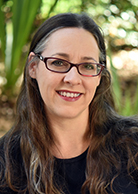 |
Welcome to the Synthetic Biology Future Science Platform (Synbio FSP) June newsletter. Yes, the year is already half way gone - how did that happen?
This is an exciting time for the Synbio FSP. Our research portfolio continues to grow, with the addition of several new University Fellows (TBA soon!). We’ve established a new partnership with Queensland University of Technology in advanced protein engineering, and welcome Professor Kirill Alexandrov as a CSIRO-QUT Professorial Fellow in Synthetic Biology. I attended the launch of the Global BioFoundry Alliance in Japan last month, where I spoke about building a national synthetic biology consortium in Australia. Both the CSIRO-UQ BioFoundry and the Macquarie Genome Foundry are now part of this Alliance.
Synthetic biology has been identified as one of several cross cutting science and technology themes in CSIRO that will underpin CSIRO’s Decadal Science and Technology Plan. This provides us the opportunity to further embed across the organisation and support future science. I encourage you to contribute to the Chief Scientist’s Decadal Science crowdsourcing campaign (see below).
To support our growth, we are excited to welcome a new Deputy Director, Alison Rice; a dedicated Project Manager, Emily Knauth; and a long term Assistant, Louise Burton. We will also be saying a very sad farewell to Lisa Deveraux, who is moving on to new challenges. I’d like to take the opportunity to thank Lisa for her outstanding support of the SynBioFSP over the last two years – without her dedication and willingness to go the extra mile, we wouldn’t have gotten to where we are today. We will miss Lisa!
The FSP has successfully built a large network of external partners and collaborators working across a diverse portfolio of projects. Moving forward, strategic consolidation will deliver a more focussed portfolio with deeper investment into fewer projects, focussing on Australia’s opportunities and competitive advantages. We are working closely with CSIRO’s Business Units (BUs) to co-develop our research strategy, leveraging off the capability we have built both internally and through partnerships. In line with this, we have held cross-BU workshops with the Manufacturing and Land & Water BUs; Agriculture & Food and Health & Biosecurity workshops are coming up. Please contact your RDs if you’d like to be involved in strategy development.
Our long term goal is to grow a synthetic biology-based industry in Australia. A key consideration will be balancing basic blue sky research with industry development and commercialisation. To support industry development, we have been working with stakeholders towards establishment of a BioIncubator in Brisbane. This will be a multi-stakeholder integrated collaborative facility, hosting a truly translational environment for advanced biotech research and development. It will provide a home with entrepreneurial and logistical support for start-ups to bridge the valley of death. We are also in discussion with some major US biotech companies who are interested in becoming ‘anchor’ companies for the incubator. Watch this space!
Finally, planning for the Synthetic Biology Australasia 2019 conference (SBA2019) is in full swing. It will be held on Monday 14th – Wednesday 16th October at Customs House, Brisbane. More details below, but it’s important to note that abstract submissions close 26th of June – which is tomorrow! Submissions accepted here.
A reminder that the SynBioFSP Open Day/workshop will be held on October 17th, immediately after SBA2019, and you need to register for both events separately (you should have received an email invitation to the open day – please request one by emailing SynBioFSP_Admin@csiro.au if you didn’t receive it or can’t find it).
All the best,
Claudia
Assoc. Professor Claudia Vickers
Synthetic Biology Future Science Platform Leader
CSIRO
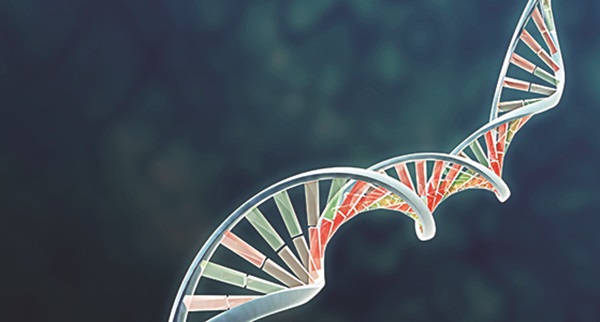
CSIRO's Chief Scientist Dr Cathy Foley is leading the co-creation of our Decadal Science Plan for 2020-2030. This plan will focus on transformative cross-cutting science and technology and help guide our priorities to ensure we are planning, supporting and delivering the science we need to solve the greatest challenges facing Australia. This will be a "rolling" plan, refreshed and updated as required so that it remains relevant.
It is important that the plan is all inclusive and created from the ideas of our scientists, engineers and staff across the organisation. That we bring together our greatest ideas on the future of science.
Dr Foley has launched a crowdsourcing challenge to begin the conversation - OurCSIRO. The challenge asks, "What are the breakthrough science areas, collaborative opportunities, and future technologies that we need to consider?"
The FSP team is encouraged to be involved in this conversation.
For more information visit: Challenges and Digital Transformation Program and Decadal Science Plan.

Dr Alison Rice, Deputy FSP Leader
Alison has worked as a senior research scientist leading research groups focused on new therapeutic options for the complications of haematopoietic stem cell transplantation in Medical Research Institutes in Sydney and Brisbane respectively. In 2012, she made the successful transition to a career in research development, incorporating research policy, research management and business development at Griffith University. In 2018. Alison took up a role as a Principal Policy Officer in the Health Innovation, Investment and Research Office (HIIRO; Queensland Health). She has drawn on her experience as a research scientist and research development expert to bring content specific knowledge about research, researchers and the research sector to the government sector. Alison’s experience in medical research, the higher education sector and government has provided her with experience in strategy development and execution, leading and managing complex projects and teams, knowledge creation, data analysis and the opportunity to engage with and develop meaningful relationships with stakeholders.
Alison has a Bachelor of Science with Honours from the University of Adelaide and a PhD in biological sciences from the University of Bordeaux II in France. She also happens to speak fluent French, having lived, studied and worked in France.
Emily Knauth, Project Manager
Emily has recently moved to the Project Manager position in SynBio after several years in the Intellectual Property team within Business Development and Commercial in CSIRO (as well as physically moving to Brisbane from our Melbourne office!). Previous to this she worked at Griffith University coordinating medical science research.
Emily completed her undergraduate and postgraduate studies at UQ where she gained qualifications in science in various areas of biology followed by further study in research commercialisation and education. In terms of research, her projects were focused on better understanding light capture in photosynthesis to guide efforts to increase efficiency.Emily also represented Australia internationally in two different sports. But you’ll have to guess which ones!
Louise Burton, Administration Assistant
Louise has over 20 years’ experience partnering with high level executives across a range of organisations in both public and private sector. These include the Queensland Government, Australian Agricultural Company (AACo) and 14 years with CSIRO Plant Industry. Louise is passionate about continuing education, knowledge sharing and networking.
After being named the inaugural CSIRO Office Professional of the Year (2008) Louise received a Swinburne scholarship to complete a Graduate Certificate of Business (Executive Administration). Always one for a challenge, the end result was better than anticipated marks and a better appreciation of the hours spend compiling, checking, re-drafting and finalising assignments!
With a background in software training, Louise was involved in the original roll-out, training and assessment of the Queensland Ambulance mobile data terminals (MDT) in South-East Qld in early 2000, including ‘on the job’ training riding around in an ambulance
We would also like to thank Lisa Devereaux, who is leaving us at the end of this month. Lisa has been an invaluable member of the FSP team over the last two years and we wish her all the best in her future endeavours!

CSIRO Library Services provides all CSIRO staff with access to a wide range of information resources, and advice supporting the research lifecycle – from ideas to published output.
Contact us for help – we have a team of librarians actively willing and able to assist you, simply call 08 8303 8555 or email AskaLibrarian@csiro.au.
ORCID ID
Have you got an ORCID ID? ORCID stands for Open Researcher and Contributor ID. ORCID is an international, not-for-profit organisation which provides researchers and scholars with a unique digital identifier (known as an ORCID iD) plus a system for linking their iD to their research activities and outputs throughout their career. It is really useful for promoting your research, and many publishers and funders are now asking researchers for their ORCID iD. If you don’t have an ORCID iD register for one - it’s quick, easy and free.
CSIRO staff find out about connecting your ORCID iD to CSIRO, so that your research outputs in CSIRO’s repositories will be updated to your ORCID record automatically.
Research Data management and planning
Do you have research data that you need to manage as part of your project ? Library staff can help you with your specific needs for data management planning or with using the CSIRO Data Access Portal, please contact Research Data Service Support.
ePublish
ePublish is CSIRO’s internal review and approval system for publications. It is used by staff for the formal review and approval of all CSIRO publications before release to a third party or for publication. If you're planning on publishing, make sure you use it!
Anne Freer is the Outreach Librarian assigned to the Synthetic Biology Future Science Platform. Let her know if you have any questions, or would like to find out how her team can assist you with your research

ON Prime empowers Australian researchers to attract the resources they need to create impact.
Purpose built for researchers, our hands-on learning program provides you with skills to take your projects and career forward, navigating the changing research landscape. ON Prime is a national program open to researchers from Australian universities and public research organisations. The program is open to researchers at any stage of their project, in any discipline.
ON Prime empowers Australian researchers to attract the resources they need to create impact and more.
Applications for our spring Prime program open 24 June, closing 22 July 2019 11.59am AEST.
Questions? Read more about the ON Prime program on our website, otherwise contact on@csiro.au to request a 1:1 chat with the members of the ON team.
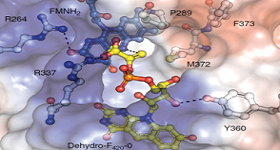 " After="" />
" After="" />
In a collaborative project between researchers at the CSIRO’s Synthetic Biology Future Science Platform, the Australian National University, and the University of Auckland in New Zealand, we’ve moved the synthetic pathway for exotic cofactor F420 into E. coli.
 " After="" />
" After="" />
Breakthroughs in biotechnology, health diagnostics and therapeutics and industrial biocatalysts will be the focus of a new research collaboration announced today between the CSIRO Synthetic Biology Future Science Platform (SynBioFSP), and Queensland University of Technology (QUT).
 " After="" />
" After="" />
CSIRO has joined a network of the world’s leading Biofoundries that will support a paradigm shift in the way synthetic biology research is undertaken.The Global Alliance of Biofoundries (GBA) brings together 16 institutions from countries including Australia, the UK, US, Japan, Singapore, China, Denmark and Canada.
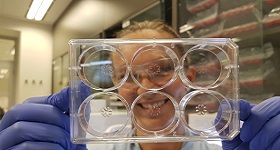 " After="" />
" After="" />
This exciting synthetic biology research project is looking at ways to deploy ‘pseudo jellyfish’ to clean up harmful spills in oceans and waterways.
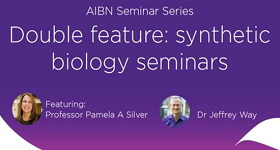 " After="" />
" After="" />
Hosted by the University of Queensland's Australian Institute of Bioengineering and Nanotechnology, featuring Professor Pamela A Silver, Harvard University (Designing Biology for Health and Sustainability) and Dr Jeffrey Way, Harvard Medical School (A quantitative synbio approach to optimisation of therapeutic fusion proteins). The seminars take place on 18 July. If you're interested in viewing them but can't attend in person please contact Louise.Burton@csiro.au for video conference details.
 " After="" />
" After="" />
Congratulations to SynBioFSP Future Science Fellow Suvi Honkanen from the University of Western Australia, who welcomed this little one into the world. Two more babies are on the way in our University/CSIRO Fellows cohort, with the second one likely arrived by the time we go to print! Diversity and inclusion is extremely important to the SynBioFSP, and we support extremely flexible leave arrangements
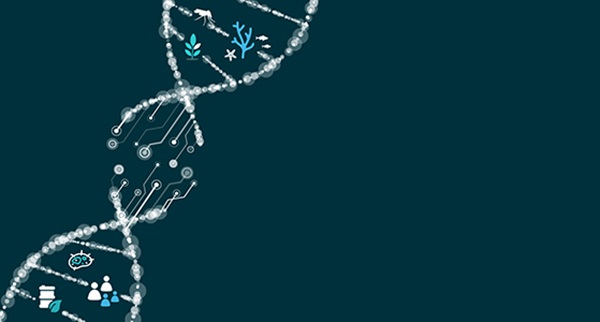
FSP opportunities
ResearchPlus CERC Postdoctoral Fellowships 2019-2020 Round 1 - Business Units are welcome to apply for funding to support new Postdoctoral Fellowship positions. Proposals should clearly articulate how a Postdoctoral Fellow will be placed into an outstanding environment, to work on an exciting project, and experience an excellent Postdoctoral Fellowship. Up to 20 Fellowships may be awarded in this round. Each Fellowship provides a grant-in-aid of $112,000 p.a. for three years, with the Business Unit to provide additional funding to support the position. Early to mid-career researchers (EMCR's) are encouraged to apply as primary supervisors.
Applications close 3 July 2019.
External Funding Oportunities
The Global Innovation Fund supports breakthrough solutions to global development challenges from social enterprises, for-profit firms, non-profit organisations, international organisations, researchers, and government agencies. The Fund seeks solutions that can scale up commercially, through the public/philanthropic sector, or through a combination of both in order to achieve widespread adoption. Funding ranges from USD $50,000 to $15 million, with the largest funding amounts reserved for innovations that can demonstrate evidence of success and that have potential to spread across multiple developing countries.
Applications can be submitted at any time.
SIEF Experimental Development Program is designed for progressing technology development to a stage suitable for attracting commercial investment and market uptake. Please contact the SIEF team (SIEF@sief.org.au) prior to commencing your application.
Applications can be submitted at any time.
Major Prizes, Awards and Fellowships
2019 ACT Scientist of the Year Award The annual ACT Scientist of the Year Award recognises the achievements of an up-and-coming local scientist with significant potential to continue to achieve in their chosen field of research. Along with excellence and global reputation in scientific research, two important selection criteria relate to i) community engagement and broader impact, and ii) how you would use the award to inspire young people to consider careers in science, so applicants need to have evidence of both science and community engagement. Only Australian citizens, or permanent residents, within 10 years of their PhD are eligible to apply.
Applications close 21 June 2019.
2019 Phillip Law Postdoctoral Award for the Physical Sciences The award is open to suitably qualified postdoctoral candidates in the area of the Physical Sciences, which include Astronomy, Astrophysics, Chemistry, Mathematics, Physics, all branches of Engineering, and related sciences. Applications are open to candidates within seven years of the conferral of their doctorate from a University in the State of Victoria, Australia. Applicants must be either an Australian Citizen or have Australian Resident Status. The Society will consider adjusting the seven year window for candidates who have spent time as primary carers following their PhD – please contact the Society if this applies to you to discuss eligibility.
Applications close 30 June 2019.
AAS Falling Walls Lab Australia 2019 The Academy invites applications from Australian researchers, postdocs and students, entrepreneurs, engineers and innovators from all areas to attend the Falling Walls Lab Australia 2019. 20 contestants will be invited to participate in this challenge with each required to give a 3 minute presentation on their research work, business model, social idea or initiative based on the “Which walls will fall next” concept. Candidates should be research active in any field of the natural sciences, including technology, engineering and medicine as well as social sciences and humanities.
Applications close 11 July 2019.
Australian Fulbright Scholarships (for Australian applicants) - the Australian-American Fulbright Commission offers scholarships to Australian citizens across all career stages (postgraduate, postdoctoral, scholar and distinguished chair). Awardees take part in an academic and cultural exchange, pursuing research or study at a U.S. institution, experiencing life abroad and bringing back their knowledge and experience to share with their communities in Australia. Applications are assessed on: high academic and professional merit, strong program proposal, defined potential outcomes, and ambassadorial skills. These is a prestigious and career-enhancing opportunity! Full details and application guidelines available on the website.
Applications close 15 July 2019.
The Millennium Technology Prize is presented every two years and awarded for a technological breakthrough made anywhere in the world. The innovation shall help to solve the great challenges of humanity while also being environmentally sustainable—€1 million.
Applications close 31 July 2019.
Travelling Fellowships and Conference Support OECD Cooperative Research Program on Biological Resource Management for Sustainable Agricultural Systems CSIRO pays Australia’s contribution to the program as the national science agency on behalf of Australian science. The Program is organised into three Themes: 1) Managing Natural capital for the Future 2) Managing Risks in a Connected World 3) Transformational Technologies and Innovation. The program can provide support to about 35 Fellows and 10-12 Conferences per year. Note that the Fellowships are not for Postdocs but are targeted at established scientists to build networks in OECD countries. Guidance available from Dr Andy Sheppard CSIRO, as the National Correspondent for the Program in Australia.
Applications close 10 September 2019.
Matthew Wilding: Protein engineering: the potential of remote mutations. Matthew Wilding, Nansook Hong, Matthew Spence, Ashley M. Buckle, Colin J. Jackson Biochemical Society Transactions, 2019
Michele Fabris, Ana Cristina Jaramillo-Madrid, Justin Ashworth, Michele Fabris, Peter J. Ralph, Phytosterol biosynthesis and production by diatoms (Bacillariophyceae), Phytochemistry, Volume 163, 2019, Pages 46-57, ISSN 0031-9422,
Michele Fabris, Audrey S. Commault, Michele Fabris, Unnikrishnan Kuzhiumparambil, Jack Adriaans, Mathieu Pernice, Peter J. Ralph, Methyl jasmonate treatment affects the regulation of the 2-C-methyl-D-erythritol 4-phosphate pathway and early steps of the triterpenoid biosynthesis in Chlamydomonas reinhardtii, Algal Research, Volume 39, 2019, 101462, ISSN 2211-9264,
Claudia Vickers & Maciej Holowko R-90525 & Fellow Hillson, N., Caddick, M., Cai, Y., Carrasco, J. A., Chang, M. W., Curach, N. C., Freemont, P. S. (2019). Building a global alliance of biofoundries. Nature Communications, 10(1), 2040. https://doi.org/10.1038/s41467-019-10079-2
Colin Scott R-90525 Alissandratos A, Hartley CJ, French NG, Kim HK, Allen S, Estavillo GM, Scott C & Easton CJ. (2019) One-pot multi-enzymatic transformation of NH3 and CO2 into the organic nitrogen plant fertilizer citrulline using a single recombinant lysate of E. coli. Sus Chem Eng
Colin Scott R-90525 Bashiri G, Antoney J, Jirgis ENM, Shah MV, Ney B, Copp J, Stuteley SM, Sreebhavan S, Palmer B, Middleditch M, Tokuriki N, Greening C, Scott C, Baker EN & Jackson CJ. (2019) A revised biosynthetic pathway for the cofactor F420 in prokaryotes. Nat. Comm. 10: 1558.
7-9 August: Plant Synthetic Biology 2019. San Jose, California
14-16 October: Synthetic Biology Australasia (more details TBC)